情态动词与一般将来时
- 格式:doc
- 大小:32.50 KB
- 文档页数:1

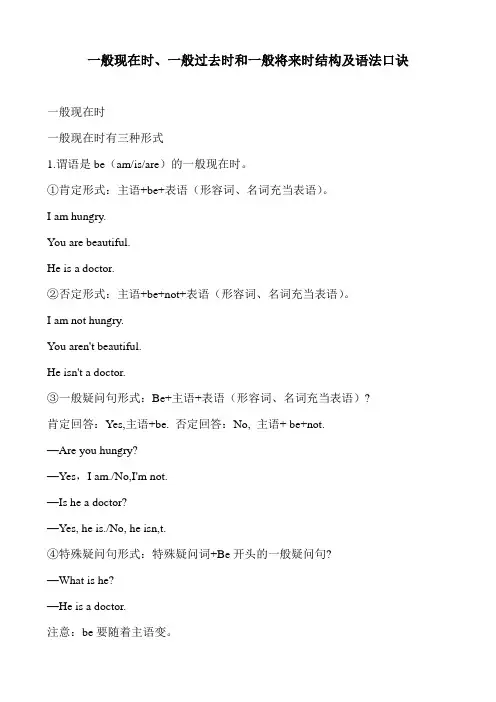
一般现在时、一般过去时和一般将来时结构及语法口诀一般现在时一般现在时有三种形式1.谓语是be(am/is/are)的一般现在时。
①肯定形式:主语+be+表语(形容词、名词充当表语)。
I am hungry.You are beautiful.He is a doctor.②否定形式:主语+be+not+表语(形容词、名词充当表语)。
I am not hungry.You aren't beautiful.He isn't a doctor.③一般疑问句形式:Be+主语+表语(形容词、名词充当表语)?肯定回答:Yes,主语+be. 否定回答:No, 主语+ be+not.—Are you hungry?—Yes,I am./No,I'm not.—Is he a doctor?—Yes, he is./No, he isn,t.④特殊疑问句形式:特殊疑问词+Be开头的一般疑问句?—What is he?—He is a doctor.注意:be要随着主语变。
2.谓语动词是实义动词(及物动词或不及物动词)的一般现在时。
①肯定形式:“主语+及物动词+宾语”或“主语+不及物动词”。
She has a little brother.她有一个弟弟。
The sun rises in the east.太阳从东方升起。
②否定形式:“主语+don't/doesn't+及物动词+宾语”或“主语+don't/doesn't+不及物动词”。
She doesn't have a little brother.她没有弟弟。
I don't eat every morning.我每天早晨都不吃饭。
③一般疑问句形式:“Do/Does+主语+及物动词原形+宾语”或“Do/Doe s+主语+不及物动词原形”。
肯定回答:Yes,主语+do/does. 否定回答是:No, 主语+ don't/doesn't.—Do you eat every morning?—Yes, I do./No, I don't.—Does she have a little brother?—Yes, she does./No, she doesn't.④特殊疑问句:特殊疑问词+do/does开头的一般疑问句?What do you like?When do you go to school?注意:根据主语确定用do还是does。
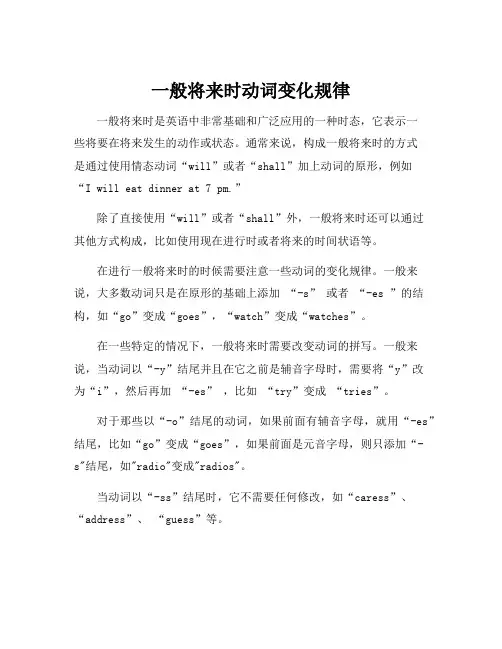
一般将来时动词变化规律一般将来时是英语中非常基础和广泛应用的一种时态,它表示一些将要在将来发生的动作或状态。
通常来说,构成一般将来时的方式是通过使用情态动词“will”或者“shall”加上动词的原形,例如“I will eat dinner at 7 pm.”除了直接使用“will”或者“shall”外,一般将来时还可以通过其他方式构成,比如使用现在进行时或者将来的时间状语等。
在进行一般将来时的时候需要注意一些动词的变化规律。
一般来说,大多数动词只是在原形的基础上添加“-s” 或者“-es ”的结构,如“go”变成“goes”,“watch”变成“watches”。
在一些特定的情况下,一般将来时需要改变动词的拼写。
一般来说,当动词以“-y”结尾并且在它之前是辅音字母时,需要将“y”改为“i”,然后再加“-es” ,比如“try”变成“tries”。
对于那些以“-o”结尾的动词,如果前面有辅音字母,就用“-es”结尾,比如“go”变成“goes”,如果前面是元音字母,则只添加“-s"结尾,如"radio"变成"radios"。
当动词以“-ss”结尾时,它不需要任何修改,如“caress”、“address”、“guess”等。
此外,还有一些常见的规则以及不规则变化规律,比如“will be able to”表示“将要能够”,“shall have been”表示“将要已经”,“I am going to eat dinner”表示“我将要吃晚餐”。
在实际的使用当中,一般将来时经常与其他时间状语连用,例如“tomorrow”,“next week”等等。
同时,当谈论即将发生的动作或状态的时候,我们会使用一般将来时态,例如“我将要去看电影”可以用“I will go to see the movie”表示。
总之,在学习和掌握一般将来时态的过程中,我们需要了解不同动词的变化规律,同时也需要注意不同的时间状语和情境,这样才能更加准确和自然地表达自己的意思。
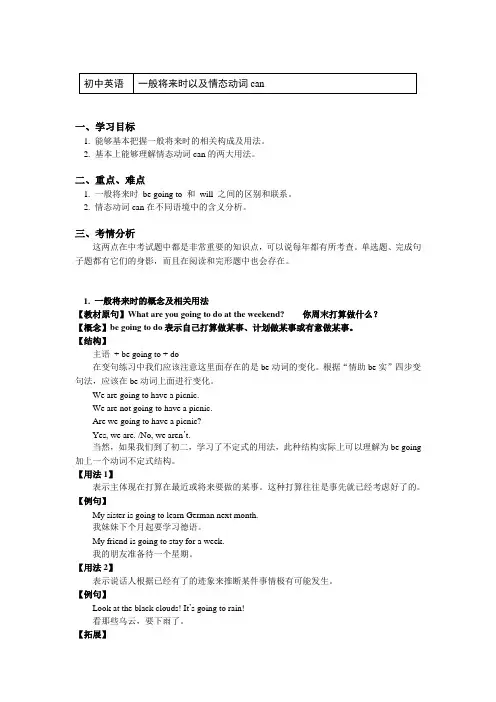
一、学习目标1. 能够基本把握一般将来时的相关构成及用法。
2. 基本上能够理解情态动词can的两大用法。
二、重点、难点1. 一般将来时be going to 和will 之间的区别和联系。
2. 情态动词can在不同语境中的含义分析。
三、考情分析这两点在中考试题中都是非常重要的知识点,可以说每年都有所考查。
单选题、完成句子题都有它们的身影,而且在阅读和完形题中也会存在。
1. 一般将来时的概念及相关用法【教材原句】What are you going to do at the weekend? 你周末打算做什么?【概念】be going to do表示自己打算做某事、计划做某事或有意做某事。
【结构】主语+ be going to + do在变句练习中我们应该注意这里面存在的是be动词的变化。
根据“情助be实”四步变句法,应该在be动词上面进行变化。
We are going to have a picnic.We are not going to have a picnic.Are we going to have a picnic?Yes, we are. /No, we aren’t.当然,如果我们到了初二,学习了不定式的用法,此种结构实际上可以理解为be going 加上一个动词不定式结构。
【用法1】表示主体现在打算在最近或将来要做的某事。
这种打算往往是事先就已经考虑好了的。
【例句】My sister is going to learn German next month.我妹妹下个月起要学习德语。
My friend is going to stay for a week.我的朋友准备待一个星期。
【用法2】表示说话人根据已经有了的迹象来推断某件事情极有可能发生。
【例句】Look at the black clouds! It’s going to rain!看那些乌云,要下雨了。
【拓展】大家应该注意到的是,be going to也可以用来讨论自己对于未来状态的一种计划。
![“一般将来时”的几种语法形式[整理版]](https://uimg.taocdn.com/6c03bef44bfe04a1b0717fd5360cba1aa8118c39.webp)
“一般将来时”的几种语法形式一般将来时的语法形式主要有四种:shall / will +动词原形;be going to +动词原形;现在进行时和一般现在时。
现将这四种形式分述如下:一、shall / will +动词原形1. will可用于所有人称,但shall 仅表示单纯将来时,用于第一人称I和we,作为will的一种替代形式。
以Y ou and I为主语时通常避免用shall。
例如:He will be back soon. 他很快就会回来。
I shall/will be free on Sunday. 星期天我有空。
Y ou and I will work in the same factory. 你和我将在同一工厂工作。
2. will, shall可用来预言将来发生的事。
如说出我们设想会发生的事,或者请对方预言将要发生什么事。
例如:It will rain tomorrow. 明天将要下雨。
3. will, shall除可表示单纯的将来时以外,还可以带有意愿的色彩,仍指的是将来。
例如:I’ll buy you a bicycle for your birthday. 你过生日时,我给你买一辆自行车。
(表示允诺) Will you open the door for me please? 请你帮我开门好吗?(表示请求)Shall I get your coat for you? 我可以为你拿外套吗?(表示提议)二、be going to +动词原形1. 表示说话人根据现在已有的迹象,判断将要或即将发生某种情况。
这类句子的主语可以是人,也可是物。
例如:There is going to be a football match in our school tomorrow afternoon. 明天下午我们学校将有一场足球赛。
(已有告示)I feel terrible. I think I’m going to die. 我感到难受极了,我想我快不行了。
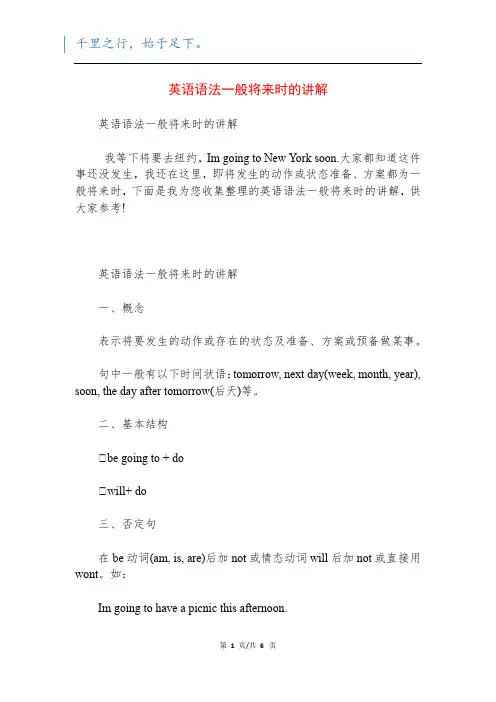
英语语法一般将来时的讲解英语语法一般将来时的讲解我等下将要去纽约,Im going to New York soon.大家都知道这件事还没发生,我还在这里,即将发生的动作或状态准备、方案都为一般将来时,下面是我为您收集整理的英语语法一般将来时的讲解,供大家参考!英语语法一般将来时的讲解一、概念表示将要发生的动作或存在的状态及准备、方案或预备做某事。
句中一般有以下时间状语:tomorrow, next day(week, month, year), soon, the day after tomorrow(后天)等。
二、基本结构①be going to + do①will+ do三、否定句在be动词(am, is, are)后加not或情态动词will后加not或直接用wont。
如:Im going to have a picnic this afternoon.Im not going to have a picnic this afternoon.I will go to have a picnic tomorrow.I will not/wont go to have a picnic tomorrow.四、一般疑问句be或will提到句首,some改为any, and改为or,第一二人称互换。
如:We are going to go on an outing this weekend.Are you going to go on an outing this weekend?五、对划线部分提问。
一般状况下,一般将来时的对划线部分有三种状况。
1. 问人。
Who 如:Im going to New York soon.Whos going to New York soon?2. 问干什么。
What 如:My father is going to watch a race with me this afternoon.What is your father going to do with you this afternoon?3. 问什么时候。
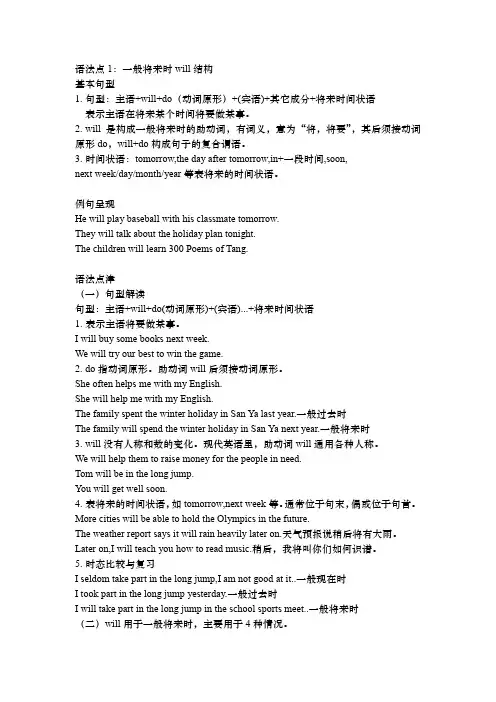
语法点1:一般将来时will结构基本句型1.句型:主语+will+do(动词原形)+(宾语)+其它成分+将来时间状语表示主语在将来某个时间将要做某事。
2.will是构成一般将来时的助动词,有词义,意为“将,将要”,其后须接动词原形do,will+do构成句子的复合谓语。
3.时间状语:tomorrow,the day after tomorrow,in+一段时间,soon,next week/day/month/year等表将来的时间状语。
例句呈现He will play baseball with his classmate tomorrow.They will talk about the holiday plan tonight.The children will learn 300 Poems of Tang.语法点津(一)句型解读句型:主语+will+do(动词原形)+(宾语)...+将来时间状语1.表示主语将要做某事。
I will buy some books next week.We will try our best to win the game.2.do指动词原形。
助动词will后须接动词原形。
She often helps me with my English.She will help me with my English.The family spent the winter holiday in San Ya last year.一般过去时The family will spend the winter holiday in San Ya next year.一般将来时3.will没有人称和数的变化。
现代英语里,助动词will通用各种人称。
We will help them to raise money for the people in need.Tom will be in the long jump.You will get well soon.4.表将来的时间状语,如tomorrow,next week等。
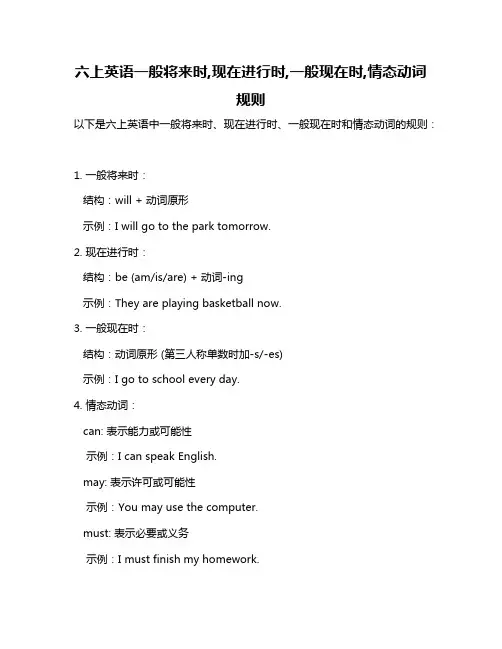
六上英语一般将来时,现在进行时,一般现在时,情态动词
规则
以下是六上英语中一般将来时、现在进行时、一般现在时和情态动词的规则:
1. 一般将来时:
结构:will + 动词原形
示例:I will go to the park tomorrow.
2. 现在进行时:
结构:be (am/is/are) + 动词-ing
示例:They are playing basketball now.
3. 一般现在时:
结构:动词原形 (第三人称单数时加-s/-es)
示例:I go to school every day.
4. 情态动词:
can: 表示能力或可能性
示例:I can speak English.
may: 表示许可或可能性
示例:You may use the computer.
must: 表示必要或义务
示例:I must finish my homework.
shall: 表示建议或命令
示例:You shall stay out of the garden.
will: 表示意愿或将来时间
示例:I will help you.
这些规则是英语语法中的基础部分,需要不断练习和巩固。
如需更多信息,建议查阅语法书籍或咨询英语教师。
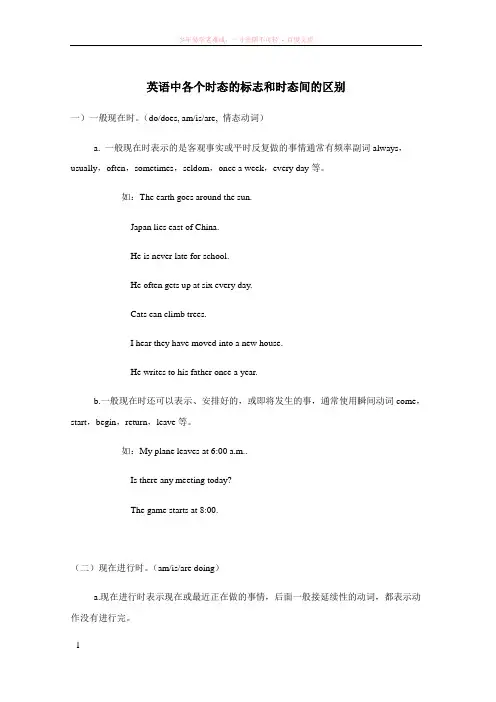
英语中各个时态的标志和时态间的区别一)一般现在时。
(do/does, am/is/are, 情态动词)a. 一般现在时表示的是客观事实或平时反复做的事情通常有频率副词always,usually,often,sometimes,seldom,once a week,every day等。
如:The earth goes around the sun.Japan lies east of China.He is never late for school.He often gets up at six every day.Cats can climb trees.I hear they have moved into a new house.He writes to his father once a year.b.一般现在时还可以表示、安排好的,或即将发生的事,通常使用瞬间动词come,start,begin,return,leave等。
如:My plane leaves at 6:00 a.m..Is there any meeting today?The game starts at 8:00.(二)现在进行时。
(am/is/are doing)a.现在进行时表示现在或最近正在做的事情,后面一般接延续性的动词,都表示动作没有进行完。
如:Look! The boy is dancing.He is watching a football game.What are you doing now?They are preparing for the exam recently.b.还常与always,usually,constantly,forever,continually等词连用表示一种语气,“总是,老是…”,如:He is always working late.Why are you always making this kind of mistake?He is continually getting into trouble with the police.c.后面接暂转动词时表示正在反复的动作,或表示将来时(一般只有go, come, leave 和have)如:The monkeys are jumping.They are hitting the tree.表将来:We are going swimming this afternoon.They are leaving here.They are having an English class tomorrow.试比较:He is doing his homework until his parents come to take him home.He will do his homework until his parents come to take him home.注:表示知觉、感觉、看法、认识、情感或愿望的动词和大部分暂转动词不能用现在进行时。

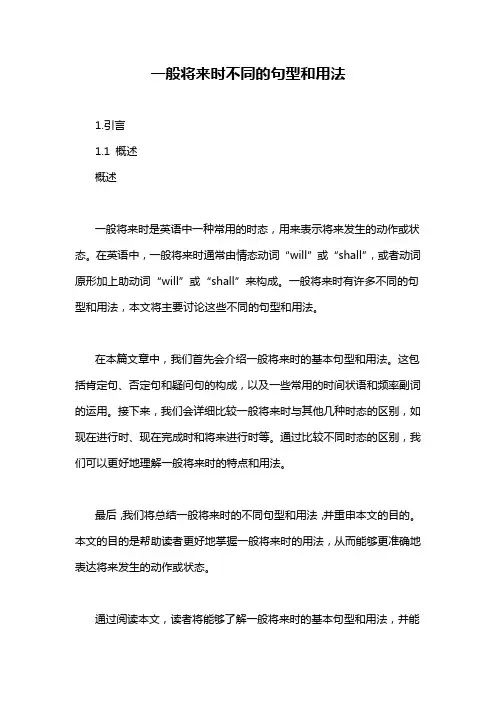
一般将来时不同的句型和用法1.引言1.1 概述概述一般将来时是英语中一种常用的时态,用来表示将来发生的动作或状态。
在英语中,一般将来时通常由情态动词“will”或“shall”,或者动词原形加上助动词“will”或“shall”来构成。
一般将来时有许多不同的句型和用法,本文将主要讨论这些不同的句型和用法。
在本篇文章中,我们首先会介绍一般将来时的基本句型和用法。
这包括肯定句、否定句和疑问句的构成,以及一些常用的时间状语和频率副词的运用。
接下来,我们会详细比较一般将来时与其他几种时态的区别,如现在进行时、现在完成时和将来进行时等。
通过比较不同时态的区别,我们可以更好地理解一般将来时的特点和用法。
最后,我们将总结一般将来时的不同句型和用法,并重申本文的目的。
本文的目的是帮助读者更好地掌握一般将来时的用法,从而能够更准确地表达将来发生的动作或状态。
通过阅读本文,读者将能够了解一般将来时的基本句型和用法,并能够区分一般将来时与其他时态的差别。
这将有助于提高读者的英语写作和口语表达能力,使其能够更自如地运用一般将来时来表达自己的意思。
接下来,我们将详细介绍一般将来时的基本句型和用法。
1.2 文章结构:本文将围绕一般将来时不同的句型和用法展开讨论。
整篇文章分为引言、正文和结论三个部分。
在引言部分,我们将对一般将来时进行概述,说明它所代表的时间以及它的基本用法和特点。
然后介绍本文的结构和目的,为读者提供一个整体的框架。
接下来进入正文部分,我们将首先详细介绍一般将来时的基本句型和用法。
我们将列举常见的句型,并给出相应的例句,以便读者更好地理解和掌握。
同时,我们还将提供一些常见的时间状语词,帮助读者更准确地运用一般将来时。
然后,我们将探讨一般将来时与其他时态的区别。
我们将与现在时、过去时进行对比,重点说明它们在表示时间和语态上的差异。
通过比较,读者将更清楚地了解一般将来时在句子中的独特作用。
最后,我们将在结论部分对一般将来时的不同句型和用法进行总结,并再次强调文章的目的。
初中一般将来时练习题及答案一、动词的一般将来时形式:情态动词will/shall + 动词原形1. I (watch) a movie tonight.2. They (visit) their grandparents tomorrow.3. She (do) her homework after dinner.4. We (go) hiking this weekend.5. He (play) basketball with his friends next Sunday.6. The dog (bark) when it sees strangers.7. The students (have) a test next Monday.8. My parents (travel) to Japan next month.9. We (meet) at the park at 5 o'clock.10. Sarah (read) a book in the library this evening.答案:1. will watch2. will visit3. will do4. will go5. will play6. will bark7. will have8. will travel9. will meet10. will read二、用所给的动词的适当形式填空(有些已经给出)1. Lucy ______ (not play) computer games after school.2. The students ______ (not have) a holiday next week.3. Sam ______ (not go) swimming tomorrow.4. They ______ (not bring) any food to the party.5. We ______ (not watch) TV tonight.6. ______ she ______ (visit) her grandmother on Sunday?7. ______ you ______ (do) your homework tonight?8. ______ they ______ (travel) to Beijing next month?答案:1. will not play2. will not have3. will not go4. will not bring5. will not watch6. Will; visit7. Will; do8. Will; travel三、选择填空1. We ___________ to the beach this afternoon.A. wentB. will goC. goD. are going2. He ________ exercise every morning.A. will doB. doC. doesD. did3. ________ Alice _______ a party tomorrow?A. Will; haveB. Does; haveC. Did; haveD. Will; has4. I _________ my homework after dinner.A. will finishB. finishedC. finishD. will finished5. They ________ late for school tomorrow.A. areB. wereC. will beD. do答案:1. B2. C3. A4. A5. C四、将下列句子改写成一般将来时1. I go swimming every Sunday.2. We have a test next week.3. They travel to China every summer.4. She plays the piano every day.5. He buys a new car.答案:1. I will go swimming every Sunday.2. We will have a test next week.3. They will travel to China every summer.4. She will play the piano every day.5. He will buy a new car.总结:初中的一般将来时是由情态动词will/shall + 动词原形构成的。
一般将来时是英语中常用的一种时态,用来表示将来发生的动作或状态。
本文将对一般将来时的定义、结构、标志词、用法和变化规则进行详细介绍。
一、定义一般将来时表示现在说话时或以后的某个时间将会发生的动作或状态。
二、结构一般将来时的结构为:will/shall + 动词原形。
主语+ will/shall + 动词原形。
三、标志词一般将来时的标志词有:tomorrow, next week, in the future等表示将来的时间状语。
另外,由于will/shall是情态动词,本身就具有表示将来的意义,因此在句子中也可以没有明显的表示将来时间的状语。
四、用法1. 表示将来的动作或状态,例如:I will go to the park tomorrow.(我明天会去公园。
)2. 表示意愿、打算、承诺等未来的确定性,例如:He will help you with the homework.(他会帮你做作业的。
)3. 表示预测、推测,常用于对未来情况的判断,例如:It will rain this afternoon.(今天下午会下雨。
)五、变化规则1. 肯定句的一般将来时结构为:will/shall + 动词原形。
例如:She wille to see me tomorrow.(她明天会来看我。
)2. 否定句的一般将来时结构为:will/shall + not + 动词原形。
例如:I will not go to the party tonight.(我今晚不会去参加派对。
)3. 疑问句的一般将来时结构为:will/shall + 主语+ 动词原形。
例如:Will youe to the meeting tomorrow?(你明天会来参加会议吗?)以上就是关于一般将来时的定义、结构、标志词、用法和变化规则的详细介绍。
希望对您有所帮助。
一般将来时是英语中最常用的一种时态之一,用于表示将来会发生的动作或状态。
用心百分百个性化辅导教案提纲教师:沈田莉学生倪中天时间:__2013__年 05 月日段一、授课目的与考点分析:一般将来时态一般将来时一.一般将来时的定义:-表:将来某一个时间将要发生的动作或存在的状态,也表示将来经常或重复发生的动作.二.一般将来时的标志性词:tomorrowthe day after tomorrownext yearnext monthnext week三、基本结构:①be going to + do;②will+ do.I shall/will go to Beijing next month.(I will=I'll)四.一般将来时的:否定句:在be动词(am, is, are)后加not或情态动词will后加not成won’t。
例如:I’m going to have a picnic this afternoon.→ I’m not going to have a picnic this afternoon.3.一般疑问句:(1).Am/Is,Are+S+going to+V+....Eg:--Am I going to see my grandfather tomorrow?-Yes,you are.(2).Will//shall+S+V+...Eg:--Shall we play volleyball next class?--Yes,you will.4.特殊疑问句:(1).What(Where,How...)+be(am,is,are)+S+going to+V+...?eg:--What are you going to do tomorrow?--I'm going to the park?五.补充说明:1.有些词如:go,come,leave,starteg: (1)She is coming here tomorrow.2."Be going to+V+..." 表示一个事先考虑好的意图,,相当于文中的"打算,计划,准备"eg: (1).I am going to spend my holiday in Beijing.(这里不能用will)3. 客观难以改变的事实,用will,而不用be going to .eg: (1).It will rain tomorrow.本次课后作业:1.It_____(rain) tomorrow.2."Are they going to have a welcome party?" "Yes, we ____(be)"3.The day after tomorrow it ____ Teachers' Day.(be)四.学生对于本次课的评价:○特别满意○满意○一般○差学生签字:五.教师评定:1、学生上次作业评价:○好○较好○一般○差2、学生本次上课情况评价:○好○较好○一般○差教师签字:校长签字:讲义一般将来时一.一般将来时的定义:-表:将来某一个时间将要发生的动作或存在的状态,也表示将来经常或重复发生的动作.二.一般将来时的标志性词:tomorrowthe day after tomorrownext yearnext monthnext week三.一般将来时的构成:1.S(subject)+be(am,is,are) going to+V+......Eg :(1).I am going to play football tomorrow.(2).She is going to watch a movie the day after tomorrow.2.S+will/shall+V+.....(1).will/shall有时可以和be going to 互换;(2).will是万能的,shall只能用在第一人称,主语是I,we.(3).will和shalleg: (1).I shall/will go to Beijing next month.(I will=I'll)(2).You will come to see me tomorrow.(you will=you'll)(3).She will read English tomorrow morning.(She will=She'll)四.句一般将来时的式:1.肯定句:(1)..S+be(am,is,are) going to+V+......(2)..S+will/shall+V+.....2.否定句:(1)..S+be(am,is,are) not going to+V+......eg:(A): I am not going to play basketball tomorrow.(B). She is not/isn't going to visit Shanghai next year.(2)..S+will/shall not+V+.....(A). I shall not go to school the day after tomorrow。
will跟shall的用法Will与shall是英语中常见的情态动词,两者虽然都表示将来的意思,但在使用中却有一些细微的区别。
本文将详细探讨will和shall的用法,并比较它们之间的不同。
一、简介1. Will: 表示未来意图或预测。
例如:I will go shopping tomorrow(明天我要去购物)。
2. Shall: 表示征求意见、提出建议或命令。
例如:Shall we go to the movies tonight?(我们今晚去看电影好吗?)二、用法对比1. 一般将来时Will和shall可用于表示一般将来时,即表达将要发生的动作或事件。
例如:- I will call you later(过会儿我给你打电话)。
- She shall arrive at the airport at 8 o'clock(她将在八点到达机场)。
2. 抱负、意愿和假设当表达抱负、意愿或假设时,通常使用will而不是shall。
例如:- I will become a doctor someday(有朝一日我会成为医生)。
- He will probably win the competition(他可能会赢得比赛)。
3. 提建议与征求意见在提建议或征求意见时,通常使用shall而不是will。
这种用法多见于疑问句中。
例如:- Shall we go for a walk?(我们去散步好吗?)- What shall I wear to the party?(我应该穿什么去派对?)4. 各人称和数的用法在第一人称单数和复数中,一般使用shall询问或表示义务。
例如:- Shall I open the window?(我要打开窗户吗?)- We shall help you finish the project(我们将帮助你完成这个项目)。
在其他人称和数中,通常使用will而不是shall。
I . Modal Verbs II . The Simple Future Tense III .The Passive
I. Modal Verbs 情态动词情态动词本身无词义,表示“能力”、“可能”、
“必须”等情态意义,不能单独作谓语动词用,只能和行为动词原型一起构成
谓语动词。
情态动词没有人称和数的变化。
常用的情态动词有:
can(could) 能够,会may(might) 可以,能
must 必须,一定should 应当
We can fly into outer space in a rocket.
我们能够乘坐火箭飞向太空。
In the future we may live on the sea ,away from noisy city .
将来我们可以离开喧闹的城市在海上生活。
We must do something to make our city clean and quiet.
我们必须采取一些措施使得我们的城市又清洁又安静。
Y ou should test these motors once more.
你们应该把这些电动机再测试一下。
This chemical w ill change to a gas at a high temperature.
这种化学药品在高温下会变成气体。
注1:“be able to+V”也能表示“能够”,be有人称、数和时态的变化。
He is able to run faster than I (am)=He can run faster than I
注2:“have to +V”也可表示“必须”,但更含有“客观条件是的必须如此做”的意思。
have有人称、数和时态的变化。
Y ou have to drive on the right in the USA.=You must drive on the right in the USA.
II. The simple Future Tense 一般将来时一般将来时的构成如下
shall /will+V shall(用于第一人称) ,will(用于所有人称)为主动词,仅用来帮助构成一般将来时,无情态意义。
一般将来时表示将来发生的行为或存在的状态。
如:
The cars of the future will be fine for getting around the cities .
这类未来的车适宜于在城市里行驶。
We will (shall) not be late for tomorrow’s meeting .
明天的会议我们不会迟到的。
注1:将来时还可用其他方法表示。
如:“be going to +V”可表示计划或预定将
要发生的行为或状态。
We are going to build a Rome.。